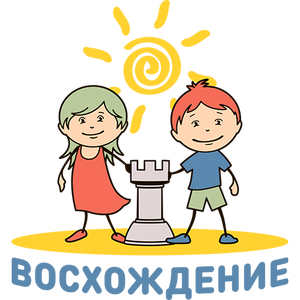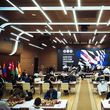The Way of Champions
Dmitry Kryakvin's story about first-shift winners and prize-takers in Sochi
The first shift is over, and the second shift in AquaLoo is about to begin, which is even more impressive because of the U21 junior tournaments. The promising Russian chess players Volodar Murzin, Arseniy Nesterov, Tagir Salemgareev, Kirill Shubin will toe the starting line (I do not intend to offend other talented players — you will have a chance to prove otherwise). The girls' lineup is no less impressive, with the titled Ekaterina Goltseva, Elizaveta Solozhenkina and the superfinalist Yulia Grigorieva to compete with lesser-known players. Intrigue is also expected among the U19 boys, where the young, but already experienced Savva Vetokhin, will participate. All in all, every tournament is attractive in its own way!
Let us talk about the youngest groups now. I'd like to make a small lyrical digression. It is often the case nowadays that a child goes to a sports school and takes private lessons at the same time. When one of the coaches' name is published on the CFR website, the second coach will not take it well. Now in Russia there exist three CFR grandmaster centers and a number of very strong grandmaster schools. The child can go to study chess to the cities of Tolyatti, Kostroma, and even Yaroslavl. To claim that “this is our merit” would be completely immodest in a situation like this.
A well-known Moscow coach Vladimir Vulfson told me the other day how deeply Mark Dvoretsky took it to his heart when the U20 world champion Valery Chekhov had pointed to Grigory Ravinsky and Anatoly Bykhovsky as his coaches, whereas Mark Dvoretsky, who had been closely working with this particular student for several years and supervised all the championship preparations, was entirely unmentioned.
Therefore, having received a couple of complaints already, I decided refrain from mentioning “this coach, that coach” in this article. Your author has already played over-the-board games to form his own opinion about many young players.
Triumphing in the U11 girls' group was Arina Berezovskaya — deep legacy of St. Petersburg keeps bringing new names to the forefront of the Russian chess arena again and again. Anna Igoshkina of Moscow has finished second. I remember Anya and her mother's emotions over some last year's minor failures, but it was obvious back then that Anya, the youngest in her group, would be capable of contesting top places the following year. Third place is with Kristina Zavivaeva from the real chess clan of Zavivaevs. Kristina and her sisters' father, Ilya Zavivaev, is a well-known organizer from the Nizhny Novgorod Oblast. Each of his girls plays chess, and not without success at that!
As for U11 boys, the competition turned out to be very tight (I know this age only well because of my son playing there). Thus, one of the main favorites, last year's Russian champion, Matfey Yurasov, has failed to duplicate his success this time around. Nikolay Kleimenov of Moscow and Arseny Kleschevnikov of the Bryansk Oblast shared first, the additional tiebreakers favoring Kleimenov. Both boys are known and, as far as I understand, have already shined in the largest children's tournaments during the pandemic. Whether online or not, hybrid or not, I give you what I have managed to google.
Let me tell you something about tiebreakers, once we have mentioned this topic. This time, the first tiebreaker known as “over-the-board game” has been removed from the tournament regulations. If last year's regulations had been effective, Kleshchevnikov's last round victory over Kleimenov would have landed him first. This is how Yurasov succeeded over Taimaz Temirbekov back in 2021. At that time, the priority of additional tiebreakers was extensively and emotionally discussed in a social network now banned in Russia, and the high management of the country's youth chess has apparently drawn some conclusions on that subject.
Ivan Golikov of Sverdlovsk Oblast finished third in this age group. Ivan is also a decent chess player with good positional approach and endgame technique. I would like to highlight again a wonderful impression left by Roman Shogdzhiev, born in 2015! Roman finished fifth, and the feeling was such that he sometimes was simply out of firepower... I can only imagine how powerfully he is going to come back here as soon as a year from now!
There were many big names in the U13 girls' group, but Victoria Merkulova of Moscow left no chances to her opponents by scoring 8 out of 9 (while this is the best result, no one has ever scored 8.5). Second place is with Mariya Vlasova of Kemerovo Oblast. Maria is the daughter of a famous master, chess author and simply a good person Nikolai Vlassov. More and more famous chess players are teaching their children to play, and this is the way to go! One of my acquaintances, who missed this period in his child's life, has recently complained: “My kid told his classmates that his dad had been playing on Lichess all night and honestly wished that his dad had better been drinking vodka instead!”
The third place belongs to the holder of the famous surname — Oksana Goriachkina. They asked me at the closing ceremony if Oksana was the spitting image of Alexandra, to whom, as you might know, GM Roman Ovechkin and I have dedicated the book titled “Small Steps to Big Chess”. The question surprised me and I did not know how to respond. Everyone who cares to examine the pictures is free to decide the question of similarities, but the main thing is that Goriachkina Jr. has also begun to achieve success in the youth chess.
Several other strong girls were in the contention as well; finishing only in place six was the rating-favorite Diana Preobrazhenskaya. I had the honor of cooperating with Diana throughout the year 2021, I know her potential and I am confident that more victories are coming the way of this athlete representing Moscow Oblast. However, there are some conclusions to be drawn by Preobrazhenskaya's coaches as a result of the Loo championships.
Finally, the boys M13 group contest proved no less intense. Here, the “chess kids” Bogdan Golovchenko and Semen Smikovski, the sons of FIDE Master Gleb Golovchenko and International Master Ivan Smikovski, were also among those in the lead. The strong Tyumen chess player Ivan Zemlyanskii could not build up on his previous success when playing in reduced time formats and ended up on fifth place. The ex-world champion among boys Artem Lebedev of Sochi finished sixth. The holder of an impressive rating of 2446, Nikolay Averin of Moscow, has finished third.
Nikolay's rating was widely discussed on the Internet — a gifted young boy (Averin has always been in good standing at his age group) gained it over children's quadruple multiplication when playing in a number of Serbian tournaments. When it comes to such cases, I usually cite a well-known story of ten years ago, when FIDE first began its Elo experiments without getting to know what chess players would really like to see in the first place. As a result, a young American chess player named Burke gained even higher than Averin's rating — not 2450, but as high as 2600 points! And Pecháč of Slovakia got a rating above 2500.
After that, there happened a game at the festival in Pardubice between one scandalous journalist and Pecháč, in which the journalist won in exactly 15 moves. Following that, the winner slightly stirred up FIDE and those responsible for the rating calculation with a devastating article. He was supported by many colleagues so that the International Chess Federation had to channel the process into reasonable limits corresponding to the minimum requirements. Thank God, no one has scored 2700 over the quadruple multiplication in the past few years! Meanwhile, Pecháč has done a great job of growing into a good chess player and a very correct person who allowed Boris Gelfand to take back his “mouse slip” in the last year's European hybrid qualification.
Stanislav Bukreev, yet another representative of the capital city, has finished second in the U13 group of boys. What is Bukreev's secret, who started the event not as one of the favorite players? It all comes down to a very simple thing of Bukreev's fighting the entire last summer in the Black Sea tournaments to turn into a real gladiator! Back then yours truly miraculously escaped from the young talent, and a round before that Bukreev had defeated GM Dmitriy Khegay.
So, if you want to become champions, you should not only study chess with strong coaches, read wonderful books from the CFR library, and watch the videos about the world champions, but you should also keep the example of the second M13 medalist in mind! That said, the new Black Sea tournaments regulations have already been published!
The victory has at last been scored by the boy who I cheered up for! Your author met Taimaz Temirbekov and his grandfather at last year's Black Sea series as well. The young hero of Dagestan is not only a strong chess player, but is also an incredibly pleasant person at that. Taimaz was also in the lead throughout the entire 2021 championship, but ended up with a silver medal. This time he would not let it go when competing against boys his senior. I do hope that our southern chess players will have yet another strong GM one day!
This is all I wanted to say for now. I extend my congratulations once again to all winners and prize-takers! See you soon!






















